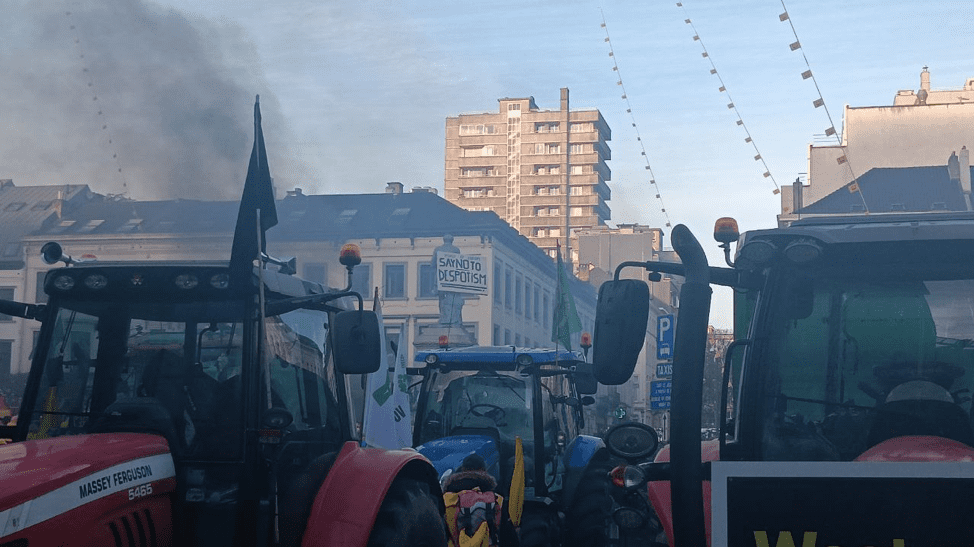
As farmers across the Continent continue protesting over-regulation and non-European Union competition, European Commission President Ursula von der Leyen on Tuesday deigned to make minor concessions to pacify the crowds on the tractors: plans to halve the use of pesticides by 2030 were taken off the table.
Farming groups had condemned the Sustainable Use of Pesticides Regulation (SUR) proposals—already rejected by a majority of MEPs in the European Parliament last November—as yet another regulatory anchor on their already struggling agricultural sector. Now, according to von der Leyen, the SUR proposal has become “a symbol of polarisation.” As such, she now argues, it should not be brought before the European Council in the weeks ahead.
No matter the rhetoric coming from the Commission, the Green Deal is at the heart of EU climate policies, and nothing they will let go of without a fight. Neither, it seems, will Europe’s farmers, who are fighting for their lives.
As Spanish farmers blocked major motorways protesting the EU’s Common Agricultural policy on Tuesday, Greek farmers, the latest to join the demonstrations, dumped apples and chestnuts in Thessaloniki and vowed to expand their protests. At present, farmers are protesting in more European countries than not, having found that they only get the concessions from the EU that they can force the bloc to reluctantly give.
In a speech on Tuesday, von der Leyen expressed her supposed empathy with the farmers’ plight, as she said they are
the first in line feeling the effects of climate change. Droughts and floods have destroyed their harvests and threatened livestock. Farmers are feeling the impact of the Russian war. Inflation, the rising cost of energy and fertilisers.
Rather than acknowledging the focus of the farmers’ protests—overregulation by the EU to reach the arbitrary ‘climate goals’ at the heart of their ‘green deal’—von der Leyen attempted to present the EU as a partner whose interests lined up with those of the agricultural sector. She said farmers “know that agriculture needs to move to a more sustainable model of production, so that their farms remain profitable in the years to come,” pointing to climate change—not her own climate policies—as the main threat to their livelihood.
The Commission President also presented “the Strategic Dialogue on the Future of Agriculture in the European Union”—a working group, including farmers, whose aim is to “analyse the situation” and come up with “scenarios for the future.” The group is scheduled to present its “enormously important” report “by late summer”—conveniently, after the European elections.
The Commission softening requirements for emission cuts on farming this week may be a reaction to the massive Europe-wide demonstrations, although partial and piecemeal EU concessions could also be used to undermine the movement.
EU’s—at least temporary— backtracking on green austerity could indicate that the legitimate agrarian outrage has had some effect on policymakers.
Frank Furedi, director of the think tank MCC Brussels, in a statement to The European Conservative declared that Eurocrats have been “forced to sit up and pay attention”, adding that the bloc’s Green Agenda had been practically “stalled” by the recent unrest. ‘Stalled,’ however, does not mean permanently halted.
Premiering in 2020, the EU’s Green Deal has been accused of cynically engineering a reduction in food production at a time of spiralling inflation and a spike in non-EU imports caused by Russia’s invasion of Ukraine, a phenomenon worsened by the EU’s politically motivated suspension of tariffs with Kyiv.
The current round of farmer protests first emerged in the Netherlands over plans to slash food production to deliver government-imposed nitrate emission cuts, with even von der Leyen’s centrist EPP faction within the European Parliament rebelling over rewilding schemes that farming groups claim would make swathes of the European countryside unfarmable.
In light of these crippling regulations and attempts from the EU to forge trade deals for agricultural products with countries unaffected by said regulations, von der Leyen’s statement that “Europe has the healthiest and highest-quality food in the world, thanks to our farmers” and that “we owe them appreciation and thanks and respect” are simply empty platitudes.
